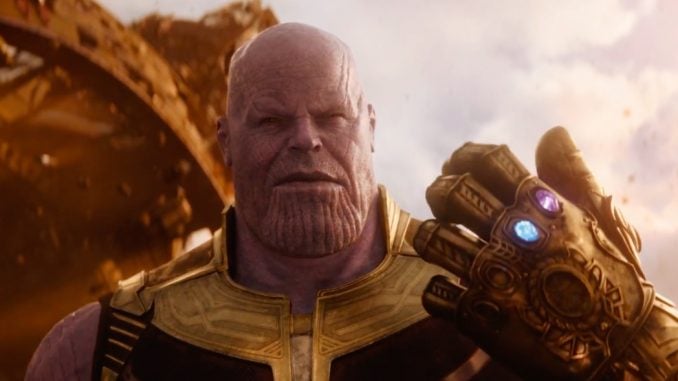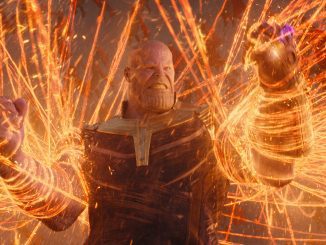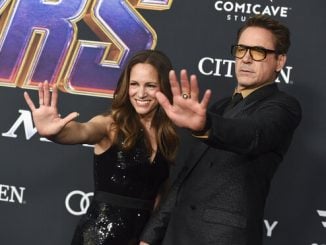
LOS ANGELES — “Avengers: Infinity War,” a.k.a. “What If Marvel Threw a Superhero Party and Everyone Came?,” feels like a movie that the American Entertainment State had to get out of its system. It’s the 19th entry in the Marvel Comics Universe, but it’s the first to push to the wall, to the max, to the ultron the notion that the MCU really is a universe: a vast intermeshed thicket of comic-book icons, destined to be an army that’s greater (in theory, at least) than the sum of its parts.
If, for decades, the metaphor for propulsive blockbuster filmmaking was the “ride,” then watching “Avengers: Infinity War” is like going to a theme park and taking three spins on every ride there.
Set in deep space, and in half a dozen lands (New York, Wakanda, Titan, Knowhere), the film presents a galactic battle for the fate of the universe that throws together the six original Avengers; the follow-up wave of Marvel superheroes who’ve only recently been given their own origin stories (Black Panther, Dr. Strange, the rebooted Spider-Man); the Guardians of the Galaxy; and a sprinkling of other figures who’ve been there on the fringes. (I had to scratch my head to remember what Vision’s powers are, but he remains the coolest shade of Revlon.)
The movie is a knowingly gargantuan Marvel mashup, so jam-packed with embattled uber saviors that you may feel, at times, like all that’s missing is Dwayne Johnson, Jesus Christ, and the cast of the last two “Star Wars” films.
So is the movie a jumbled, top-heavy mess of cynical franchise overkill? Sort of like the bloated and chaotic “Avengers: Age of Ultron” taken to the second power? Far from it. It’s a sleekly witty action opera that’s at once overstuffed and bedazzling.
The directors, Anthony and Joe Russo, as they proved in the last two “Captain America” sequels, are far more stylish and exacting filmmakers than Joss Whedon, who made the first two “Avengers” films. “Infinity War” is a brashly entertaining jamboree, structured to show off each hero or heroine and give them just enough to do, and to update their mythologies without making it all feel like homework. At the same time, you may begin to lose hold of what made each of these characters, you know, special.
Early on, a donut-shaped alien spaceship lands in midtown Manhattan, allowing the effete Continental sadist Ebony Maw (Tom Vaughan-Lawlor), who’s like a kick-ass version of the Ghost of Jacob Marley, to ring-lead some FX street mayhem. Stephen Strange (Benedict Cumberbatch), after trying and failing to match Ebony in wisecracks and firepower, gets sucked into the ship, and it’s up to Tony Stark (Robert Downey Jr.) to rescue him, with an assist from Spider-Man (Tom Holland), a pop-culture geek who wonders if he’s in the middle of an “Alien” film, and who Tony outfits with anti-gravity armor.
Once Tony and Strange are thrown together, you can’t help but notice that both are imperious quipsters with matching goatees, and they razz each other exquisitely, the main difference being that Strange keeps forming those light circles that look like they’re made out of sparklers. Tony, of course, has his zippy metal power suits, but a number of the other characters do, too, including Bruce Banner (Mark Ruffalo), who after the opening fight spends the entire film trying and failing to call forth his inner Hulk.
“Avengers: Infinity War” can, at times, make it feel like you’re at a birthday party where you got so many presents that you start to grow tired of opening them. But taken on its own pinata-of-fun terms, it’s sharp, fast-moving, and elegantly staged. It also has what any superhero movie worth its salt requires: a sense that there’s something at stake.
The urgency derives, in this case, from the film’s villain, Thanos, the malevolent Dark Lord of the wrecked planet Titan, played by Josh Brolin (in a supremely effective motion-capture performance) as a towering armored walking-statue demon with a chin sculpted like Abraham Lincoln’s beard, and a demeanor of soft-spoken Nietzschean intelligence. He’s like Hellboy, the Hulk, Darth Vader, and Oliver Stone rolled into one eloquent sociopath.
Thanos’ master plan could hardly be simpler — and neither, despite its gushing river of characters, could the film’s storyline. Thanos is on a mission to gather all six of the Infinity Stones (candy-colored gems named for Mind, Soul, Time, Power, Space, and Reality), several of which are in the hands of our heroes (Vision, played by Paul Bettany, has one of them embedded in his forehead). If Thanos succeeds, it would allow him, in a mad instant, to destroy half the beings in the universe.
This seems like the most dastardly of plans, and is. Yet Thanos thinks of himself as a genocidal humanitarian (sort of like Chairman Mao). The universe’s resources are limited, and he intends to slice the population in half so that what remains of it can thrive. Brolin infuses Thanos with his slit-eyed manipulative glower, so that the evil in this movie never feels less than personal. It also feels like a force that might just require 20 superheroes to stop it.
At a few key moments, the war really does get personal, as when Thanos is reunited with Gamora (Zoe Saldana), the adoptive stepdaughter he rescued as a girl in the midst of wiping out her planet. She won’t give into him now, even when he’s got her android half-sister, Nebula (Karen Gillan), suspended and torturously stretched into her metallic body parts. Saldana, in a ripely emotional performance, plays Gamora like a raging refugee from an abusive home, and the resolution of her conflict with Thanos gives “Infinity War” the (rare) moving moment it needs.
Gamora’s fellow Guardians, meanwhile, are off doing what they do: saving the cosmos (to the tune of the Spinners’ “The Rubberband Man”), but never letting that endeavor get in the way of their ability to take the piss out of each other. The two Marvel franchises come crashing together — literally — when the bloody, barely sentient Thor (Chris Hemsworth) bumps into the windshield of the Guardians’ ship. There is much mooning over his muscles (Drax: “It’s like a pirate had a baby with an angel!”), which is funny, and so is the rivalrous back-and-forth between Thor and Star-Lord (Chris Pratt), who in contrast to the stentorian stud of Asgard has never seemed more of a dude. He feels like he’s got to lower his voice just to keep up with him.
The Guardians split into two factions, with Rocket (Bradley Cooper) and the sulky, video-game-playing adolescent Groot (Vin Deisel) heading off with Thor, who refers to Rocket as “the rabbit.”
Then, just when you’re sure that the film has more than enough spinning subplots, along comes Steve Rogers, played by Chris Evans in a beard that, frankly, is less becoming to his role than the one sported by Thor. Hemsworth wears his facial hair as a sign of the character’s battered-but-unbowed soul, but in Evans’ case it looks as if it’s not just Rogers but the actor who has grown a bit depressed at the prospect of being Captain America. The team he’s leading — he’s got Black Widow (Scarlett Johansson) and War Machine (Don Cheadle) in tow — feels like the least exciting, and the most extraneous to the main action.
“Infinity War” brims with tensely spectacular combat sequences, even if the question of who’s going to win each one has that extravagantly arbitrary could-Mighty-Mouse-beat-up-Superman? quality. Luminous daggers get plunged into bodies, to no effect. Thor, after meeting with his weapons guru (Peter Dinklage, acting very Shakespeare) and bracing himself against the burning force of a star, gets a new super-hammer — an ax, actually — which is presented as an ultimate tool until it fails, at a crucial moment, to do what we think it’s going to do. (The weirdest thing about superhero movies is that they’re bombastically physical…and metaphysical. Which often doesn’t make sense.)
The climax is set in Wakanda, where T’Challa (Chadwick Boseman) doesn’t have much to do besides orchestrate a battle against an army of squishy alien beasties. It isn’t until the arrival of Thanos that the sequence takes off not just visually but dramatically.
Of all the things that have ever happened in an MCU movie, there will be much chatter about the ending of “Infinity War.” It is dark and spooky and, in its way, chancy and shocking. Do any of our beloved characters die? Well, yes. But, in fact, the ending is so audacious that you realize it’s all an elaborate card trick. Despite what it shows us, these movies are rarely about more leading to less. Count on the sequel — due one year from now — to demonstrate that more, in the MCU, will lead only to more.



